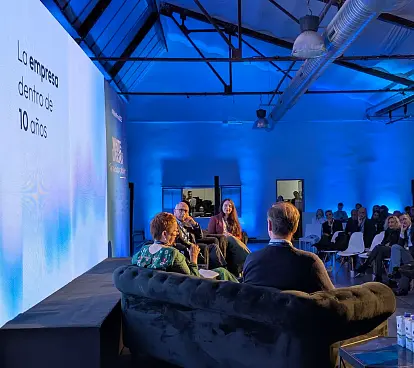
More talent, less work
September 10, 2019
“So, what do you want to be when you grow up?” is a question that now comes across as somewhat obsolete: lawyer, doctor, fireman, astronaut, architect. While vocational careers may well continue to be relevant far into the future, they’ll have less and less to do with the concept of work.Talent will become more prominent.
Whereas a job is learned and executed, talent is more closely related to intrinsic factors such as genetics and our personalities, as well as our environment, the parts of our surroundings that motivate us and how those around us influence us.
For a long time, society has placed more value on work than talent, which is why education has focused on instilling knowledge rather than developing skills. With this new digital age we’re living in that of a knowledge society it’s been a long time since we lived through fundamental changes such as those that came out of the industrial revolution when millions left the countryside and agricultural jobs to live in cities and work in factories.
The next stage in human evolution may be a new societal model in which work, as we currently know it, becomes less and less relevant to people, as machines will do the bulk of the work, computers that have been programmed by people to carry out repetitive tasks that, until now, they had to complete.
In 2017, medical journal BMJ Open published the results of a global study which showed that for half of the world population, medical consultations with a primary care provider lasted, on average, less than five minutes. Medical appointments ranged from 48 seconds in Bangladesh to 22.5 minutes in Sweden. As you can imagine, if a doctor’s job consists in seeing patients for eight hours a day in five-minute slots, something clearly isn’t right with the way we approach work in a medical setting, to give an example.
Continuing with healthcare, for some time now, tests using Artificial Intelligence have shown that machines can be significantly more efficient in tasks such as image analysis in, for example, cancer detection. Likewise, we’re increasingly going to find cases in which machines lead the way in some jobs that up until now have been limited to humans. Quite simply, somewhere in the world at this very moment, a programmer specialized in Machine Learning is working to make this happen.
Against this backdrop, it’s becoming increasingly necessary to make changes in the strategies we apply to the subject of work: the time has come to shift our focus to talent.
Let’s begin with Education.
Many people believe that it’s far more complicated to change the way an adult thinks than the way a child, still in the initial phases of learning, does. In reality, the technology-driven transformations that we see in society are of such importance that we can’t just intervene in the education of children and youth. We must also do the same with adults to encourage the changes in mindset we need to face the future we are moving forward.
“I have never let my schooling interfere with my education” Mark Twain
When it comes to educational models, we’ve been talking about the need to change and adapt to the actual needs of society and the labor market for years. However, in reality, we’re not seeing these transformations happening at the intensity or pace we need. It is probably because the educational programs we currently have in place still focus on learning different subjects and knowledge building, rather than skills, abilities or the development of the talents individuals possess so that they’re able to excel at these in the future.
Education with Artificial Intelligence.
As we continue our search for new educational models capable of strengthening individuals’ talents, it’s also necessary to consider how we can harness Artificial Intelligence, followed by other technologies, such as Virtual Reality in the short term, or Neurotechnology in the long term.
Regarding Artificial Intelligence, we’re moving towards a world in which we’re going to amplify human intelligence thanks to technology. Just as chess players have been doing since Deep Blue beat Gary Kasparov, working together with Artificial Intelligence can help us learn more and learn better. Later down the line, this is going to help us advance to the next level, once we are ready to link our minds to machines gifted with intelligence that can transform into learning assistants or accessories.
There’s no doubt that this might sound incredibly futuristic, but so might teaching Artificial Intelligence in schools, something that’s already happening in China. They’ve introduced AI as a subject starting in the first few years of school, allowing children to become familiar with the technology that they’ll soon begin to interact with as consumers, and more importantly as professionals. The Chinese government’s bet on AI development is resolute, as reflected by such initiatives. Don’t you think this type of news should push us to believe that our schools could also begin to incorporate technological advances to improve how students learn and ensure that they are better prepared when the time comes to join the workforce?
Teaching Philosophy.
When talking about a future in which Artificial Intelligence plays such an important role, people may feel unnerved, and AI can pose a genuine threat if implemented incorrectly, focusing on developing the actual technology without considering human factors. The answer to counteracting such a possibility lies in teaching philosophy and humanities.
It’s essential to consider philosophy as a tool in the educational process, a tool that can help us become better people and better professionals. These days, it’s a subject that we learn and then promptly forget, one that rarely has an impact on students’ lives apart from boredom and the occasional sleepless night spent studying for an exam.
Many things are not taught at school, or that are not given enough importance, for example, aspects related to health or finance. While it’s clear that these are best addressed in the family home, schools can also provide support for these areas, which are so crucial in students’ futures. As for philosophy, school is the ideal place to study the most influential philosophical works. And not just Western philosophy. Eastern philosophy, though not often explored in our schools, is highly recommended for understanding how the world and people work.
Reading philosophical works and, more importantly, discussing them in the classroom can be invaluable in educating and training future professionals who are going to face challenges in their jobs similar to those posed by the shift from a productive model based on agriculture to an industrial one. These transformations are so profound that they can’t be approached solely from a personal level. That’s why “standing on the shoulders of giants” is so valuable in understanding what we are going through.
Let’s not ignore art.
Do you ever wonder why Artificial Intelligence experts are dedicating so much time to teaching machines to create art? Music, painting, film. If you follow the news around Machine Learning, you’ll have heard about the software that’s able to paint works of art just as if it were a disciple of Rembrandt or the machine-produced painting that was auctioned off by prestigious auction house Sotheby’s.
If the people developing Artificial Intelligence are taking pains to teach it to create art, shouldn’t we give art more important in education? And not just in schools, where they already do quite a lot. Why do we stop developing our artistic capabilities when we finish school? Those who cultivate creative skills are better equipped to face challenges that come up in the professional world, having developed creativity and higher sensitivity.
May education never ends
Another mistake related to educational models that we are making as a society is interpreting education as something that starts at school at ends at university, or rather, something that occurs exclusively at these institutions. The day we begin to promote the idea that learning and training should be a regular part of our lives, we will gain a lot as both personal and professionals.
This idea of lifelong learning and development is something that scientists take to heart. Their work would be impossible if they didn’t dedicate time to learning about their colleagues’ discoveries and new techniques, for this is what feeds their investigations. This need for continued learning of new technologies, languages, and methodologies is also evident in technical professions, as it allows us to face the increasingly demanding challenges arising from technological development.
However, what about the rest of the professions? Consider, for example, professors who acquired vast amounts of knowledge when getting their degrees, confirmed in a public examination, which they finally ended up passing on to others. Shouldn’t such a professor continue to dedicate time to learning to teach better? Undoubtedly, many do so, but I’m sure the majority limit themselves what’s necessary to do their job. If we want things to improve at an educational level, this is no longer a viable option. Luckily, with the advent of the Internet and e-learning platforms such as Coursera and Udemy, we have infinite opportunities for continued learning, allowing us to keep growing both as people and professionals.
However, why don’t schools and universities cultivate ongoing relationships with their students as they advance in their professional lives? When I said goodbye to school, no one wrote or called to offer me the opportunity to remain linked educationally. Instead, someone decided that there was no longer a need for me as a “client.” The same happened or didn’t happen, at university. Why don’t we develop career plans in a way that allows us to continue our development at these institutions as we progress in our careers?
Especially now that many universities are having difficulties surviving due to a lack of students. A fantastic way to generate additional business would be to offer learning opportunities to professionals, not just through post-graduate and doctoral degrees, but also through specific courses that allow us to continue to grow in our fields, building upon and enhancing what we are meant to have learned when studying for our degrees.
Why have only one job?
Putting the subject of education to one side for a moment, and moving on to the issue of work, there are several aspects related to how we approach our professional lives that need to adapt to the changes resulting from technological advances. Our current model of work, which “obliges” us to work at one job for eight hours a day, five days a week, 20 days a month and over 200 days a year, could start to become obsolete. Surely a model in which we can balance different jobs or projects, occasionally change activity and develop different skills would be more motivating. Moreover, while the focus is essential in attaining professional expertise, always doing the same thing can become tedious and kill our creativity.
It’s true that in many positions, it’s normal to change activity frequently, particularly when you have a certain level of responsibility, need to manage a team or have a role that depends on projects you need to develop. In any case, though, as the years' pass, one can begin to experience burnout. Changing jobs is always an option, something that was uncommon even a few years ago. However, having various roles throughout your career is the new normal.
The possibility of having alternate employment or a second job can provide a breath of fresh air, bringing happiness to our careers and, moreover, our lives. That’s why we’re increasingly talking about Side Project as a way to advance or grow professionally, which can also help the companies where we work. It’s that famous 20% of the time that Google employees dedicate to personal projects, which can even evolve into new business opportunities for the company. We should also mention secondary activities of many professionals who also contribute as professors, speakers, writers, among other options.
More Talent and Less Work
Let’s return to the title of this article to delve deeper into the idea of placing more value on talent than work. When we talk about work, we’re referring to dedicating a series of hours in the day to complete a job at a company or any organization for which we receive financial compensation. Don’t you feel that it doesn’t make much sense that everyone must work precisely eight hours a day? Are we really identical when it comes to our capacity to complete tasks, our productivity, and our creativity? Just as the educational field has been talking about how each individual has his or her own pace and learning style, the same should happen with work.
In a not too distant future, people will carry out fewer and fewer routine tasks because there will be software or robots capable of doing so in a more efficient manner. Moreover, it will be the talent that will make the difference in our relationship with work, not the amount of time we dedicate to professional tasks or our experience in carrying out specific tasks. Instead, creativity, improvisation, the ability to solve problems, and how we understand the needs of people, clients, and colleagues will become more critical. That’s why we must begin by assigning more value to all of these areas instead of those that until recently were given priority, such as having a certain college degree or specific experience. Soft skills will increasingly be given more importance, while bit by bit, the others will shift to the background.
At this point, many of you may be thinking, “I like this school of thought, but how can I start applying it in my job or at my company?” Luckily, we are steadily beginning to have access to tools that can be incredibly powerful in this process, such as agile methodologies and, especially, a talent management methodology called OKR. We’ll tell you more about it in upcoming editions of Futurizable newsletter.
Our latest news
Interested in learning more about how we are constantly adapting to the new digital frontier?

Insight
February 9, 2026
How the new LLMs hosted on Atlassian work: a guide for companies seeking secure AI

Event
November 24, 2025
White Mirror 2025: the blank mirror reflecting what is yet to come

Tech Insight
May 28, 2025
LLMs, Vibe Coding, and software development

Event
May 26, 2025
Madrid pulses with the new era of Artificial Intelligence at the Google Cloud Summit 2025